- Home
- Holly Hepburn
Snowdrops at the Star and Sixpence Page 2
Snowdrops at the Star and Sixpence Read online
Page 2
‘Sam—’ Nessie began.
‘What?’ Sam replied with raised eyebrows. ‘You could have charged half the National Grid from the electricity I felt when I walked in on you, that’s all I’m saying.’
Nessie felt her cheeks growing hot. ‘Really, you do talk rubbish sometimes. He’s married.’
Her sister cocked her head. ‘Maybe not him, then, but I bet there’s someone else here who’ll help you get back on the horse.’
‘Sam!’ Nessie protested, blushing even more. ‘Stop.’
‘It’s okay, Ness. Getting divorced doesn’t have to mean game over, you know.’
It must seem so straightforward to Sam, Nessie thought, feeling a surge of emotion and willing herself not to cry. She couldn’t know what it was like to walk away from fifteen years of marriage; although she hadn’t got as far as divorce – not yet. One step at a time, Nessie told herself.
Sam’s voice broke into her thoughts again. ‘It’s time you moved on, that’s all I’m saying. Now, where do you suppose our father left the wine? Or do you think he drank it all before he died?’
Chapter Two
An insistent rumbling whine woke Sam early the next day. Clamping the pillow around her ears, she closed her eyes but it was like trying to sleep through roadworks. She stared at the bumpy, unfamiliar ceiling for a while, summoning the courage to poke her toes out of the covers and into the chill morning air. It was a long way from her life as a PR golden girl with a chic little flat in Kensington, she thought with a rueful sigh. She and Nessie hadn’t been able to get the central heating working the night before so the only source of warmth in the bedroom was an electric heater that glowed radioactively in one corner and looked like it might spontaneously combust as she slept. Deciding to brave the cold, Sam had unplugged it.
The bed, which looked as though it had been hijacked from Antiques Roadshow, had proved unexpectedly comfortable and once she’d adjusted to the peal of church bells marking the hour, she’d slept well. Until now. It was probably a good thing she hadn’t been able to find a single drop of alcohol in the pub or she’d have had a hangover to contend with as well as London withdrawal. But either someone had done an excellent job of hiding the booze or Andrew Chapman really had drunk the place dry.
The rumbling finally drove Sam out of bed. She winced as her feet connected with the thinly carpeted bedroom floor – she’d have to invest in some heavy duty slippers or possibly some snow boots for these early winter mornings: her fat-burning flip-flops were going to be no use here. Shivering, she tugged on some clothes and crossed the creaking floorboards to the window. It was hidden behind thick wooden shutters but she could see a crack of brilliance around the edges, suggesting sunshine outside, and the illusion of warmth. Tentatively, she pulled the shutters open, half-expecting an avalanche of spiders but the doors came open easily, with no nasty surprises. They revealed blurry leaded diamonds and beyond them, a sea of emerald grass: the village green bathed in the bright December sun.
Sam blinked and took a step back. ‘Coffee,’ she croaked, rubbing her arms to get the blood flowing. ‘That’s what I need. A vat load of coffee.’
The upstairs rooms of the pub were even more in need of TLC than downstairs, Sam thought, as she negotiated the narrow landing that led from the bedrooms. Technically, it was a duplex, with a living room, bathroom, kitchen and two bedrooms on the first floor, and three more bedrooms in the attics above, but not even the most optimistic estate agent would have described it that way. Sam and Nessie had taken one look at the dark and crooked stairs to the attic and agreed to leave exploring up there until they’d settled in a little more. Or possibly a lot more. They had explored the tiny kitchen, which boasted an assortment of scruffy wall units, a fridge-freezer that leaned alarmingly to one side and a sink that seemed to have been used as a tea-urn. A small round table and two wobbly chairs took up the rest of the space. The living room held two mismatched sofas, an empty bookshelf and a boxy old TV.
‘Let’s get the beds made,’ Nessie had suggested, trying to stifle a yawn. ‘It’ll look better in the morning.’
Sam found Nessie downstairs, doing battle with the kind of vacuum cleaner that looked like it had come out of the seventies. It had a gigantic, heavy-looking plastic base and a blue bag ballooned above it. Nessie was using both her hands to push it around the floor. She’d grouped all the tables at one end, piled the chairs on top in a precarious-looking pile, and there was a bucket of dirty water next to the much-cleaner fireplace. What time did she get up? Sam wondered. Had she even been to bed?
‘Ness!’ she called, over the thunder of the cleaner. ‘Nessie!’ Her sister’s head jerked up, like a startled meerkat. She relaxed when she saw Sam and reached for the off switch. ‘Morning. How did you sleep?’
‘Pretty well,’ Sam admitted. ‘How about you?’
‘Not bad.’ Nessie glanced away and Sam knew it was a lie. She wondered exactly how many times her sister had got up to check the door was bolted shut, or to investigate a noise she couldn’t identify. The pub was an old building, full of creaks and groans, and Nessie could be anxious at the best of times. She’d probably been awake all night.
‘Fancy a coffee?’ she asked.
Nessie pulled a face. ‘No coffee. Sorry, I thought I’d brought some.’
‘No problem, I’ll go and get a jar. There must be a shop somewhere here.’
‘I think the Post Office sells groceries,’ Nessie said. ‘You’ll probably get some in there.’
‘Excellent,’ Sam said, her mouth watering at the thought of a deliciously dark roasted blend. ‘I’ll see what I can find.’
The Post Office was on Star Lane, which ran along one side of the green. Sam grinned as she passed the phone box, half-expecting an eccentrically dressed stranger to leap out waving a sonic screwdriver but it was empty, unused. The war memorial held a handful of names, villagers who’d gone to fight for their country and never returned. Just like every other village in England, Sam thought, decimated by a war they thought would be over by Christmas.
The shop was split between a glass-fronted, unattended Post Office counter at the back and another counter nearer the front, with a woman stood behind it. She was thin and grey-haired and her eyes gleamed when Sam walked in. She peered over the top of her wire-rimmed glasses. ‘Hello. Now let me see . . . you must be Samantha Chapman.’
Sam blinked. ‘Uh, yes, I’m Sam. Hello.’
The woman held out a paper-skinned hand. ‘I’m Franny Forster, postmistress and Chair of the Little Monkham Preservation Society. How are you and Vanessa feeling after your long drive from London?’
‘We’re okay,’ Sam said cautiously. Was this how everyone behaved in a village, acting like they knew all about you even though you’d only just met? Maybe Nessie had run into her when she’d visited the pub originally, although she’d never mentioned it. ‘I’ve come in search of coffee.’
‘Of course you have,’ Franny said, bustling out from behind the counter. ‘You arrived so late last night that I expect you need a bit of caffeine to boost your energy levels. Of course, you’ve got a lot of work ahead of you if you want to get the pub back up and running in time for the grand re-opening.’
She plucked a blue-lidded jar from a shelf and handed it to Sam.
‘Grand re-opening?’ Sam echoed. ‘I don’t think we’d got as far as planning—’
‘Oh yes, you must have a re-opening party,’ Franny said, returning to her position behind the counter and stabbing at the till. ‘The Star and Sixpence has been part of village life here for over four centuries. It’s never been closed, not even through the wars, until your father’s unfortunate demise. So we thought Boxing Day for the re-opening, if that suits you?’
Sam felt her mouth drop open. ‘Boxing Day? But that’s less than a month away. Three weeks, in fact. And it’s Christmas first.’
Franny’s eyes gleamed. ‘That is how it usually works, yes. So I expect you’ll want to get back there, won�
��t you? To get on with things?’
‘Yes,’ Sam said faintly, feeling more in need of coffee than ever. ‘Yes, I suppose I will.’
‘That’ll be three pounds ninety-nine, then,’ Franny said with a satisfied nod, holding out her hand. ‘For the coffee.’
‘Fucking hell!’ Sam burst out, glancing at the cheap-looking jar in her hand. Franny sniffed, as though she didn’t approve of such language and took the note Sam gave her.
Sam decided two things on her way back to The Star and Sixpence: life in Little Monkham was going to take a lot of getting used to, and they needed to find somewhere else to shop.
There was a man peering through the windows of the pub. He was bent low, one hand shading his eyes as he stared inside. Sam felt a stab of alarm and broke into a run.
‘Hey!’ she shouted the moment she was near enough. ‘What do you think you’re doing?’
He straightened up at the sound of her voice and turned around, just as Sam skidded to a halt in front of him. ‘I was looking for the new owner. I guess that might be you?’
He was taller than her, maybe a year or two younger, she guessed, which made him late twenties. He was fair-haired with a slightly untidy beard and bright blue eyes that were fixed on her with undisguised interest. His waxed jacket had seen better days and his jeans were faded but when he smiled, his eyes twinkled with warmth and Sam realised he was quite attractive, in spite of the beard. He didn’t look like trouble but she wasn’t about to lower her guard, not yet. Ignoring his outstretched hand, she narrowed her eyes. ‘Who wants to know?’
His smile faded. ‘Joss Felstead. I came about the job.’
‘Job?’ she echoed. ‘What job?’
‘I used to be cellarman here, for Andrew, and I reckon you’re going to need my help to get the place ready for the re-opening. It’s only—’
‘—three weeks away,’ Sam interrupted. ‘Yes, so I’ve been told.’
She stared at him and he met her gaze, relaxed and apparently confident that she wasn’t about to turn his offer down. Sam upgraded her opinion from attractive to good looking. He was nothing like the immaculately groomed men she encountered in London PR circles but cleaner – fresher – somehow, and more appealing. The confidence was familiar, though, the in-built awareness of his own charm that so many men seemed to have; arrogance, almost. She bet he was a real heart-breaker among the village’s female population.
‘What makes you so sure we need your help?’ she asked, raising an eyebrow.
Joss shrugged. ‘I worked here for eleven years; I know the cellars like the back of my hand. I know what beers do well, which ones need a cool corner, which ones won’t settle on the uneven bit of floor. I know how to flush the pipes and clean the lines and you’ll forgive me for saying this, but you don’t look like you know much about any of that.’
Sam let out a small huff of disbelief. What had the residents done, issued a newsletter with their names and photographs before she and Nessie had arrived? It was weird, that’s what it was. And where did he get off, telling her what she did and didn’t know? ‘I might,’ she said, haughtily. ‘I might know everything there is to know about beer and . . . and pipelines.’
He smiled. ‘If that’s the case, then I suppose you don’t need me after all. Sorry to have bothered you.’
He turned and began to walk away. Sam knew – just knew – he was waiting for her to call him back, to admit she didn’t know the first thing about ridiculously named beers like Badger’s Arse and Rusty Ferret. He was probably counting to ten, a smug, self-satisfied grin hovering around his beardy mouth. She wouldn’t give in, she wouldn’t, she wouldn’t . . . except that the entire village was expecting the pub to re-open on Boxing Day; they’d practically thrown down a gauntlet challenging the two sisters and Sam wasn’t one to refuse a challenge. More than that, she wasn’t one to fail a challenge. And the trick to always winning was knowing when to accept help.
‘Wait!’ she called, despising herself a little bit for doing so. ‘Wait. Are you any good with spiders?’
‘Nessie?’ Sam called, pushing open the door and walking into the pub. ‘There’s someone here I think you should meet.’
Her sister popped her head above the bar, rubber gloves on her hands and a dripping sponge clenched between her fingers. ‘What?’
Sam led Joss forward, hoping he hadn’t seen the wary look Nessie aimed his way. ‘This is Joss. He used to look after the cellars before the pub closed.’
‘Hi,’ Joss said, and flashed an easy smile. Sam decided it was something he did a lot, a weapon he used to get his own way. And then she thought of all the times she’d done exactly the same thing back in London, to swing an important deal or charm a big client.
‘Joss wondered if we could use his help to get things ready to re-open.’
Nessie frowned uncertainly and lowered the sponge to the bar. ‘Oh. Well, yes, I expect we will do, when the time comes but there’s a lot to do before then.’
‘That’s the other thing I need to tell you,’ Sam said. ‘Apparently, we’re having a grand re-opening. In about three weeks’ time.’
‘Three weeks?’ Nessie squeaked, her nervousness about Joss vanishing. ‘Says who?’
‘Says Franny Forster, chairwoman of the village Preservation Society,’ Joss said gravely. ‘And trust me, Franny is not someone you want to be on the wrong side of, especially if you are trying to run a business in Little Monkham.’ He lowered his voice to a conspiratorial whisper. ‘The last shopkeeper to cross her ended up closing down and moving four hundred miles away.’
‘That’s ridic—’ Sam began, but then she thought of the way Franny had known who she was and where she’d come from before she’d even stepped over the threshold and she shivered. A woman like that in charge of the village Post Office might know an awful lot about people. Maybe it wasn’t so ridiculous that she wielded a lot of power in Little Monkham. Sam looked at Joss and found him already watching her. ‘Right,’ she said, swallowing a rueful sigh. ‘When can you start?’
Chapter Three
The clean-up began in earnest after that. Sam set up an office on the kitchen table and spent most of the morning on the phone, speaking to the breweries and builders, arranging for deliveries and getting quotes for skips.
‘It’s a good thing I did my licensee course and all the legal stuff before we came,’ Nessie said, reading through the paperwork from the local council. ‘We’ll just have to hope the premises licence comes through in time, although Christmas is going to be a problem. Everything shuts down for the holidays.’
‘It’ll come through in time,’ Joss said, as he came up the cellar stairs with an armful of mouldy cardboard. ‘Franny will make sure of that. She’ll sort your builders out too. You won’t have any problems, as long as you do what she wants.’
‘I’m a little bit scared of Franny,’ Sam said.
Joss shook his head solemnly. ‘Don’t underestimate her. She’s basically Darth Vader in a dress, but she gets things done.’
Nessie wasn’t sure what to make of Joss yet but she had to admit he worked hard; the cellar had been cleared of spiders and debris, and he’d shifted all the tarnished old kegs to make way for the incoming fresh ones. She’d been horrified to discover her father had been paying him in cash for as long as he’d worked there and Joss had been less than enthusiastic about setting things straight; in fact, he’d brazenly negotiated a pay rise to cover the tax he’d have to pay once they added him officially to the payroll. Nessie didn’t like the way he looked at Sam, either; his gaze lingered a fraction too long when he spoke to her and his smile became just a little bit more charming. He was making an effort. Sam might be too busy to have noticed yet but Nessie knew her sister well; it was only a matter of time before she started to pick up on Joss’s interest and then Nessie would have to remind her that she was technically his employer – fooling around would only complicate things. At least Joss hadn’t tried to flirt with her – then again, she knew sh
e lacked her sister’s sparkle. Sam was only four years younger but she turned heads, not because she was classically beautiful but because she shone. Nessie had never been able to compete; she had learned long ago not to try, so it was no surprise that Joss had barely looked her way. She was actually glad of her invisibility – she’d forgotten more than she ever knew about flirting but the havoc she’d seen Sam wreak was enough to put her off for life. Nessie preferred to busy herself cleaning the tables and chairs, doing her best to match them up and fit them into the pub’s nooks and cubby holes. Once she’d finished those, she began polishing the brass until it gleamed. By the time she was done, the pub looked reasonable, if a bit haphazard.
‘Hey, it doesn’t look half-bad. Nothing that a bit of paint and some decent lighting won’t fix,’ Sam declared, when she came downstairs from the cramped kitchen. She peered around the back of the terrible oil painting she’d pointed out the night before. ‘And it’ll be even better once I get rid of this.’
Nessie hesitated. The painting was awful. ‘Don’t damage it.’
Sam unhooked the mock-gilt frame and lifted it off the wall. ‘I’m not sure I could. And the others are even worse.’
She waved a hand at the other paintings on the walls, all with the same frame, all less than brilliant. Nessie counted three seascapes, a still life and a nude that made her wince. A snippet of conversation from the night before floated through her head: Owen had mentioned the name of the artist, hadn’t he? Frowning, she tried to remember who it was. ‘It was someone from the village. We should try to find out where they live, give the paintings back.’
‘You want Henry,’ Joss called across the bar. ‘World War Two veteran and pillar of the Little Monkham community. Can’t paint much but it doesn’t stop him trying.’
‘See?’ Sam demanded, glancing at Nessie. ‘No one likes them. I don’t know why they’re even here.’

 Christmas Kisses at the Star and Sixpence
Christmas Kisses at the Star and Sixpence Sunset over Brightwater Bay
Sunset over Brightwater Bay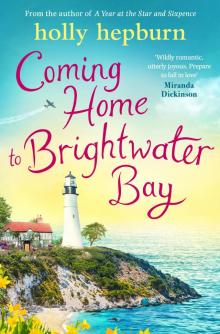 Coming Home to Brightwater Bay
Coming Home to Brightwater Bay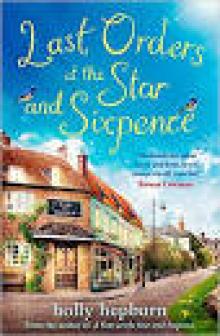 Last Orders at the Star and Sixpence
Last Orders at the Star and Sixpence The Little Shop of Hidden Treasures Part Two: Secret Loves
The Little Shop of Hidden Treasures Part Two: Secret Loves Broken Hearts at Brightwater Bay
Broken Hearts at Brightwater Bay Sea Breezes at Brightwater Bay
Sea Breezes at Brightwater Bay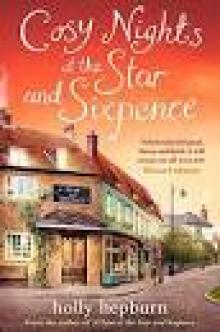 Cosy Nights at the Star and Sixpence
Cosy Nights at the Star and Sixpence Last Words at the Star and Sixpence
Last Words at the Star and Sixpence The Little Shop of Hidden Treasures Part One: Starting Over
The Little Shop of Hidden Treasures Part One: Starting Over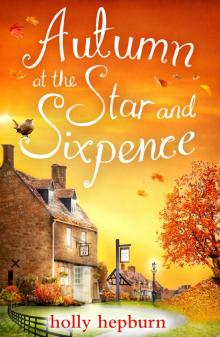 Autumn at the Star and Sixpence
Autumn at the Star and Sixpence The Little Shop of Hidden Treasures Part Two
The Little Shop of Hidden Treasures Part Two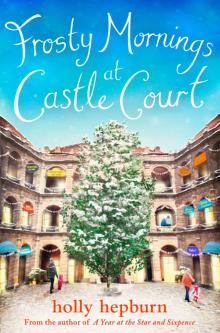 Frosty Mornings at Castle Court
Frosty Mornings at Castle Court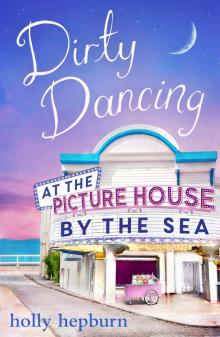 Dirty Dancing at the Picture House By The Sea
Dirty Dancing at the Picture House By The Sea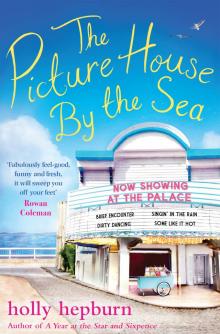 The Picture House by the Sea
The Picture House by the Sea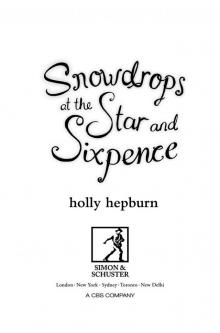 Snowdrops at the Star and Sixpence
Snowdrops at the Star and Sixpence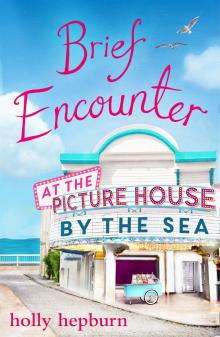 Brief Encounter at the Picture House by the Sea
Brief Encounter at the Picture House by the Sea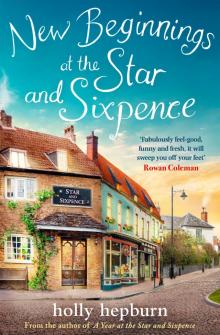 New Beginnings at the Star and Sixpence
New Beginnings at the Star and Sixpence Christmas at the Star and Sixpence
Christmas at the Star and Sixpence Starry Skies at Castle Court
Starry Skies at Castle Court Snowy Nights at Castle Court
Snowy Nights at Castle Court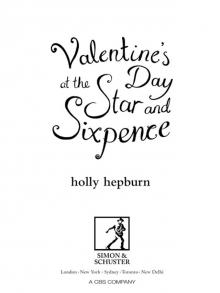 Valentine's Day at the Star and Sixpence
Valentine's Day at the Star and Sixpence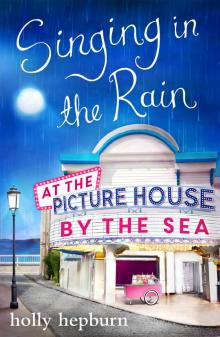 Singing in the Rain at the Picture House by the Sea
Singing in the Rain at the Picture House by the Sea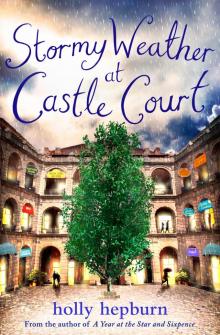 Stormy Weather at Castle Court
Stormy Weather at Castle Court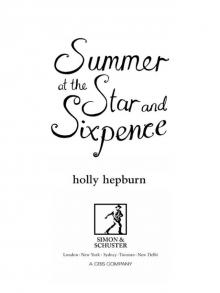 Summer at the Star and Sixpence
Summer at the Star and Sixpence